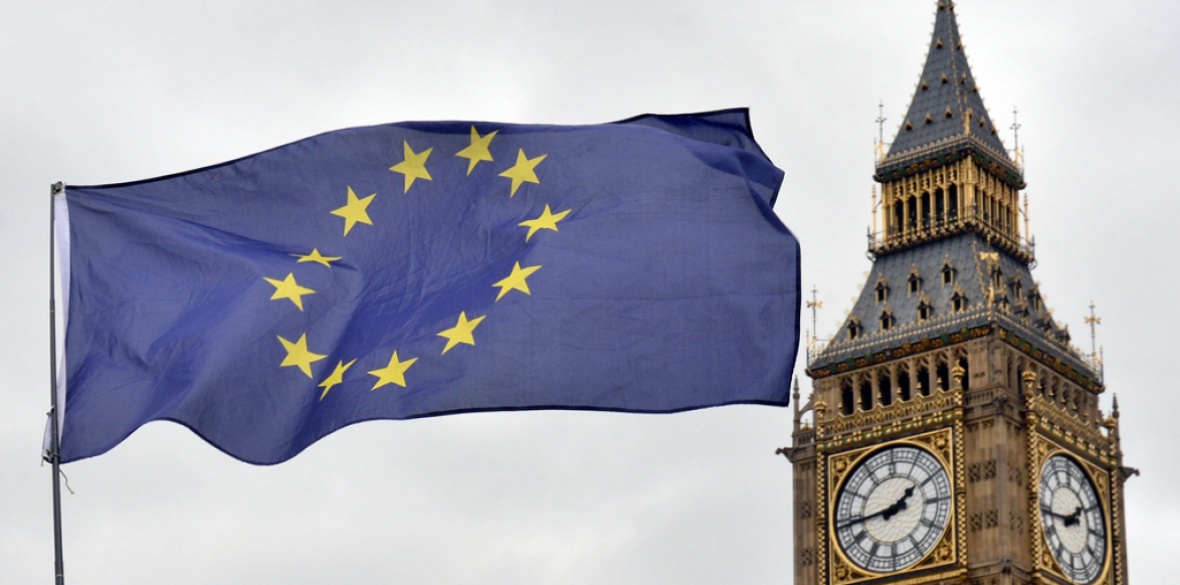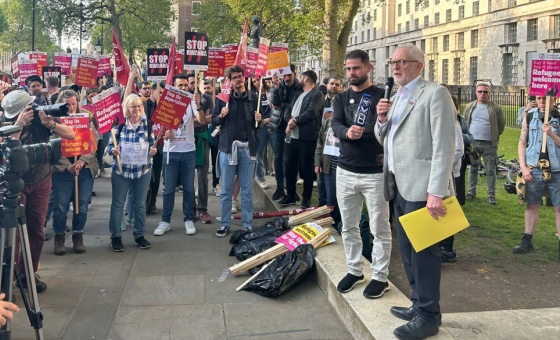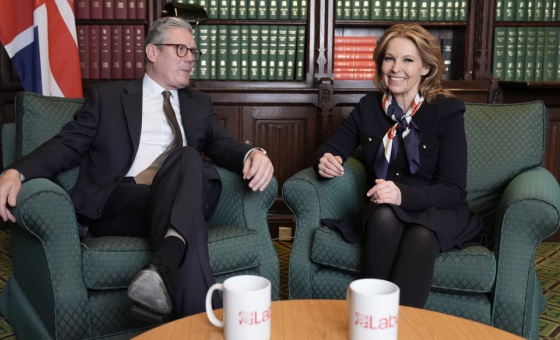This is the last article you can read this month
You can read more article this month
You can read more articles this month
Sorry your limit is up for this month
Reset on:
Please help support the Morning Star by subscribing here
THE YEAR was 1987. Thatcher had signed the Single European Act. This signalled Britain’s fuller integration into what became the European Union.
With sovereignty surrendered, the pressure for a reversal of the labour movement’s long-standing opposition to European capitalist integration intensified.
In the late 1980s, the labour movement was in bad shape. A slump conjoined with a Thatcherite destruction of manufacturing capacity and Thatcher’s deregulation of the financial markets — combined with the unashamed “monetarist” fiscal policies she and her chancellor pursued — drove unemployment over three million.
Coal, energy (gas and electricity) and water were privatised diverting a revenue stream to private owners.
With rising unemployment, pay inevitably came under pressure — and despite mass campaigning, notably around the left-led Marches for Jobs, the unions were on the back foot. Membership fell from over 13 million in the mid-1970s to under eight million with many more now outside of collective bargaining agreements.
Attacks on union rights, which under the previous Labour government had been defeated by firm union opposition to Barbara Castle’s In Place of Strife proposals, were renewed.
After a decade of fiercely fought rearguard actions the coup-de-grace on union workplace power was administered by the 1988 Employment Act only made possible by the defeat of the miners’ strike.
The introduction of new technology in the printing industry was pushed through without union agreement by a combination of anti-union laws, the scab leadership of the Electrical Trades Union and outsize bonuses for Maggie Thatcher’s boot boys in the Metropolitan Police.
Sensing union weakness, Thatcher’s cabinet abandoned any pretence that consensual relations along the “corporatist” model were either possible or desirable.
The scene was set for further retreat on pay and jobs while the erosion of the foundations of the post-war economy presaged a more complete defeat for the working class and its movement.
While this had organisational and political features it was in the sphere of ideology and class consciousness that retreat was most apparent.
Jacques Delors — who died last week at the age of 92 — became president of the European Commission in 1985, and continued in post through to 1995, by which time the defeats the British working class suffered had been eclipsed by counter-revolution which overthrew socialist relations of production in the USSR and socialist Europe.
It was in this growing atmosphere of defeat that the long-standing trade union and Labour Party opposition to Britain’s integration into the capitalist common market came under attack.
The TUC position — withdrawal from the European Economic Community as it was known — was grounded in a 1981 Congress decision that reflected fairly solid opposition by many unions. It was echoed in Labour Party conference policy that party leader Michael Foot upheld, although an active right wing — stronger in Parliament than in the constituencies or unions — was a constant pressure to conform to ruling-class preference.
The TUC establishment — always close to the Foreign Office on the cold war Atlantic alliance and thus bound to protect US interests in European affairs — was an enthusiastic participant in the various European industry and trade union adjuncts.
By his own admission, the key figure in this process was the TUC functionary David Lea, who was eventually elevated to the Lords for his services — and is now disgraced.
As head of the TUC economic department and assistant general secretary, Lea had worked with Delors when he was the French EEC commissioner. Delors, now elevated to president of the EU Commission, planned to bring before the European Council proposals for an added “social dimension” to the European Single Market legislation then being formulated.
This was to include tidbits in the form of workers’ rights to information, consultation and negotiation, as well as to permanent training.
I was reporting from the 1988 TUC conference when Delors sold the forthcoming 1992 Single European Act as the foundation of the “social dimension” to the integration of the European Single Market. He held out a vision of a regulated market that reconciled capitalist competition with “close co-operation and solidarity.”
The code word was “social dialogue,” presented as a mechanism which held the promise of guaranteed social rights including worker’s right to be covered by a collective agreement; labour market reforms such as the status of temporary workers and the right of workers to lifelong education in a changing society.
For the trade union right wing, it presented a formula for dissolving class conflict in the workplace and in wider society, while among delegates, it seemed to offer a chance to win concessions that could not be won within the British state — but through the institutional power that, so Delors offered, resided in institutions at the European level.
In a round table discussion 20 years later, the GMB’s John Edmonds, who as chair had skilfully steered the September 1988 TUC conference, reflected on the speed with which attitudes had changed. The TUC, he said, had a longstanding opposition to EC membership and was calling for withdrawal, but by October, both the TUC and the Labour Party were actively in favour of membership.
This he described as a veritable “coup,” with the TUC shift in position then confirming the reversal in Labour’s position, with the affiliated trade unions then disposing of 90 per cent of votes at the party’s conference.
With union opposition neutered and Labour bought into the consensus, Thatcher’s successor as Tory prime minister, John Major, negotiated an opt-out from the Social Chapter.
This left Britain bound into the mechanisms of the single European (capitalist) market replete with the Maastricht treaty obligations that enforced privatisation, imposed budgetary constraints and put important elements of the economy under external control.
Game, set and match.
Inevitably rank-and-file opposition surfaced but the overall political effect was to corral the trade unions into a pathetic pleading for the return of the Social Chapter with hope repeatedly deferred to the election of a Labour government.
The eventual New Labour administrations of Tony Blair and Gordon Brown — even more committed to labour market flexibility than the Tories — proved substantially more sympathetic to employers than to trade unions.
It was to meet the public expenditure constraints imposed by the EU treaty that then-chancellor Gordon Brown enthusiastically took up a Tory government mechanism — public-private partnerships — that notionally shifted investment in health, education and infrastructure off the index of public spending.
It quickly became clear that these private finance initiatives were a disaster. Far from the private sector taking on risk, government had to underwrite investment.
On the eve of the 2008 financial meltdown, the total capital value of PFI contracts signed was £68 billion, with the British taxpayer tied to a £215bn bill over the life of these contracts.
Workers at the sharp end of public spending constraints, most notably in local government, health and education, made sure that their unions took opposition to PFI to the TUC and the Labour Party.
TUC general secretary John Monks — later made a baron and recycled to lead the EU-funded European TUC — was humiliated when TUC delegates repudiated his rearguard defence of Labour’s PFI policy. Subsequent events confirmed the principle that when affiliated unions surrender opposition to right-wing policies this is quickly implemented but when they oppose Labour’s right-wing drift they are systematically ignored.
Thus, when in 2002, delegates to the Labour conference condemned PFI the policy was ignored by the parliamentary party and leadership.
It was a wilful blindness to the neoliberal nature of the eurofederalist project that hobbled trade union opposition to the policies that inevitably flowed from Britain’s obligations under the Maastricht and Lisbon treaties. There developed a schizophrenic approach in which the effect of the policies was condemned but the official gaze was averted from the root cause.
This weakened the anti-capitalist case against neoliberalism. It was not that outside of the EU any conceivable British government might not adopt neoliberal policies. The capitalist crisis’s global character meant that it would, just like every other developed capitalist government. But the fact is that the decisive elements of the British ruling class were bound into the EU as their chosen instrument to implement these policies. This had the added attraction that without repudiating the country’s treaty obligations and leaving the EU decision-making was even further from the reach of the working class.
The Brexit referendum into which Cameron, in a fit of bourgeois Bullingdon bullishness, blundered was the accidental mechanism whereby power was, for a moment, in the hands of the British people and not their masters.
The tragedy of these years lies in the failure of the labour movement to take advantage of the split in our ruling class and take the lead in the fight to regain sovereignty.
Where elements in the labour movement sided with big business and the banks, this surrendered the initiative to those capitalist and finance sector elements who inflected opposition to EU membership with a divisive and diversionary racism and chauvinism.
It was persistent illusions about the nature of the EU that gifted Boris Johnson a wedge issue with which Labour’s right wing, in alliance with every element of the big business Establishment – from security services to media moguls — could beat off Corbyn’s Labour challenge.
Nick Wright blogs at 21centurymanifesto.wordpress.com.










